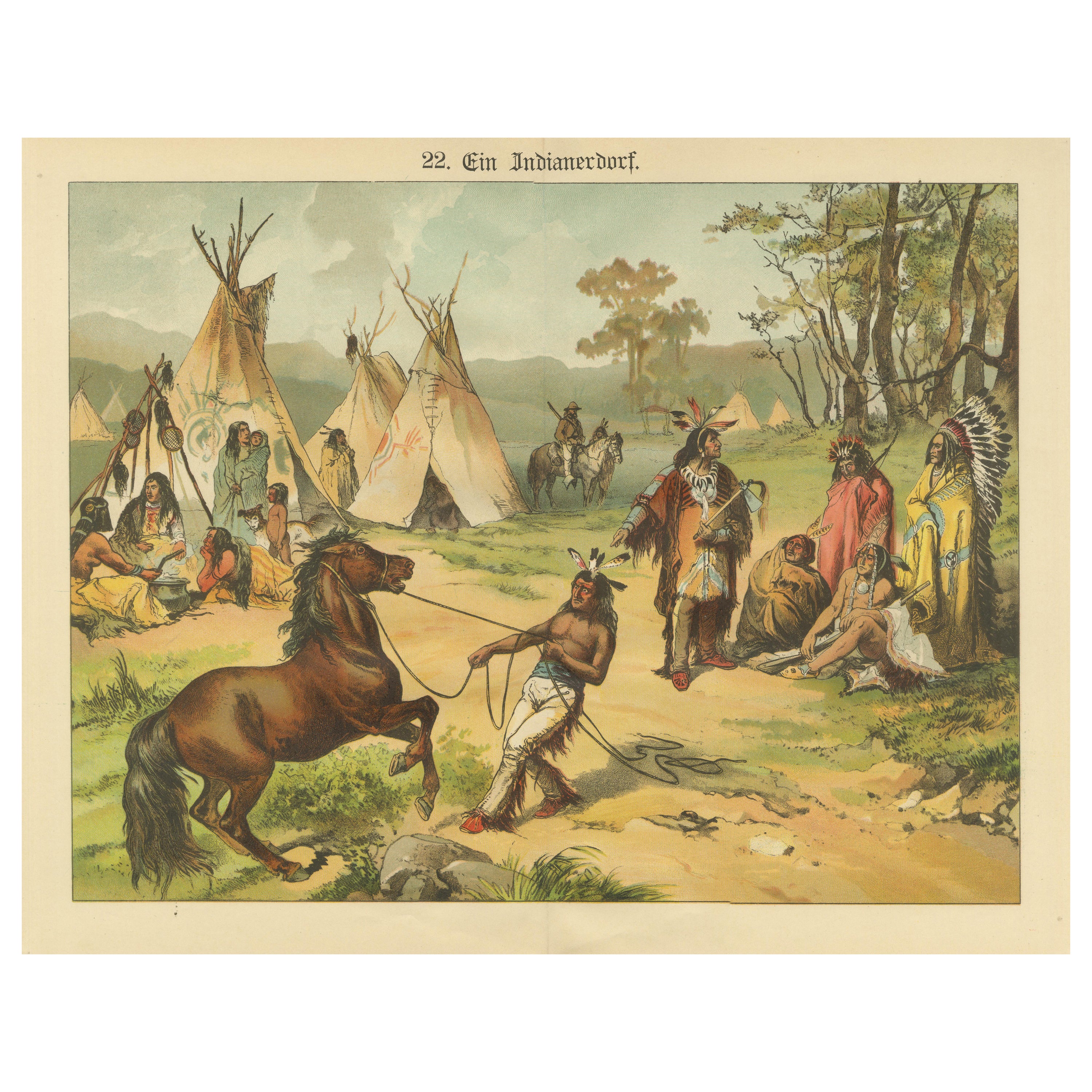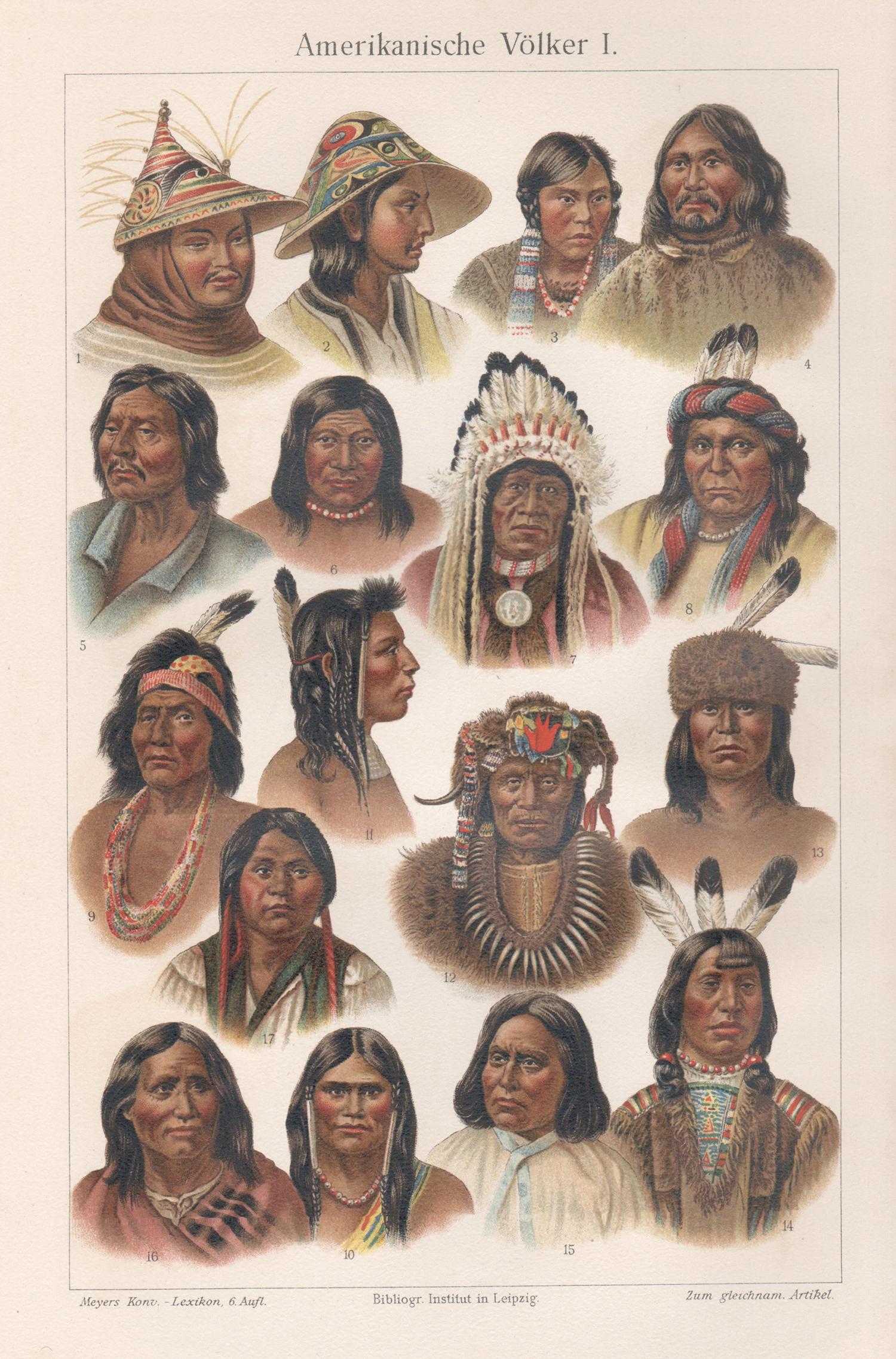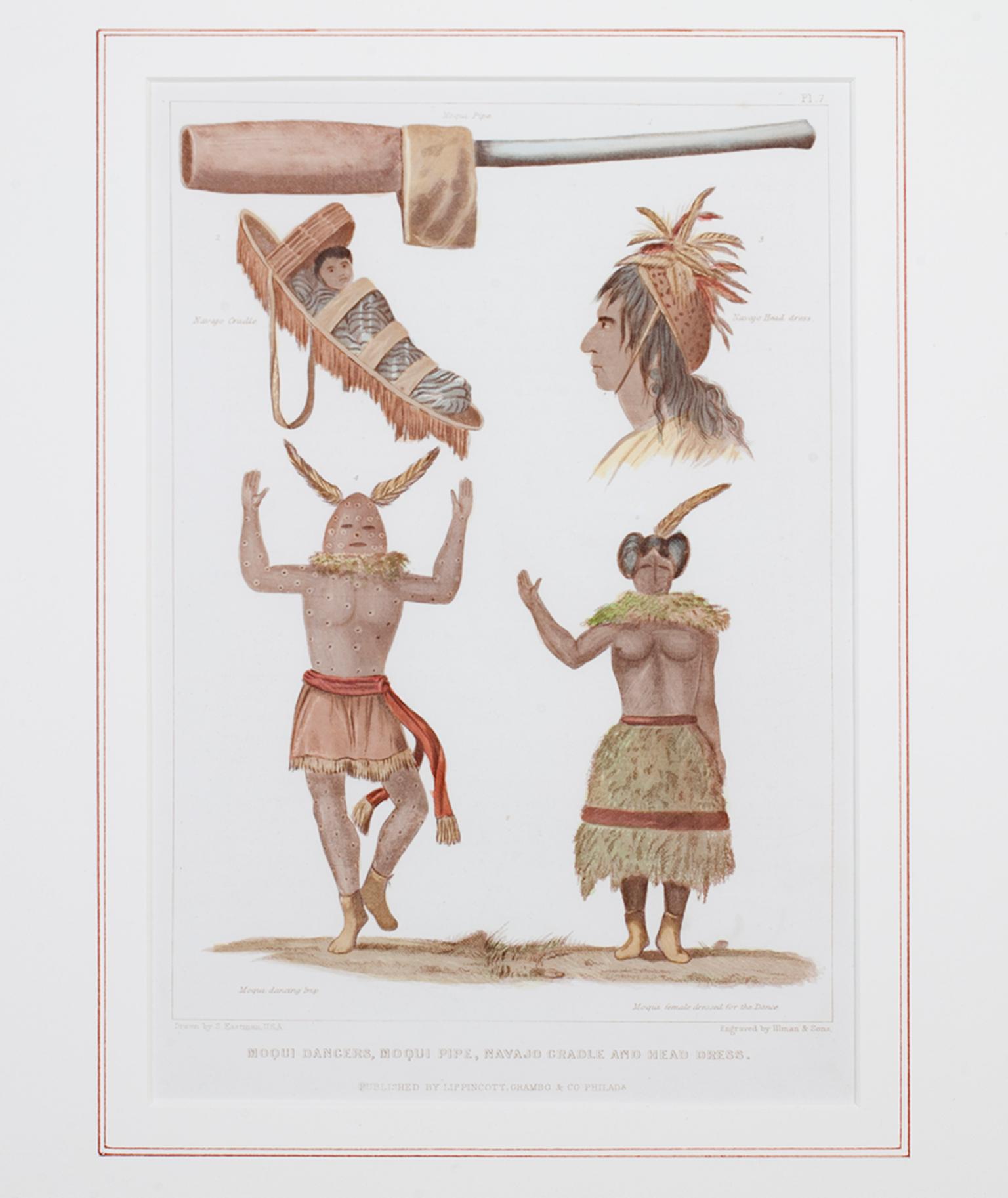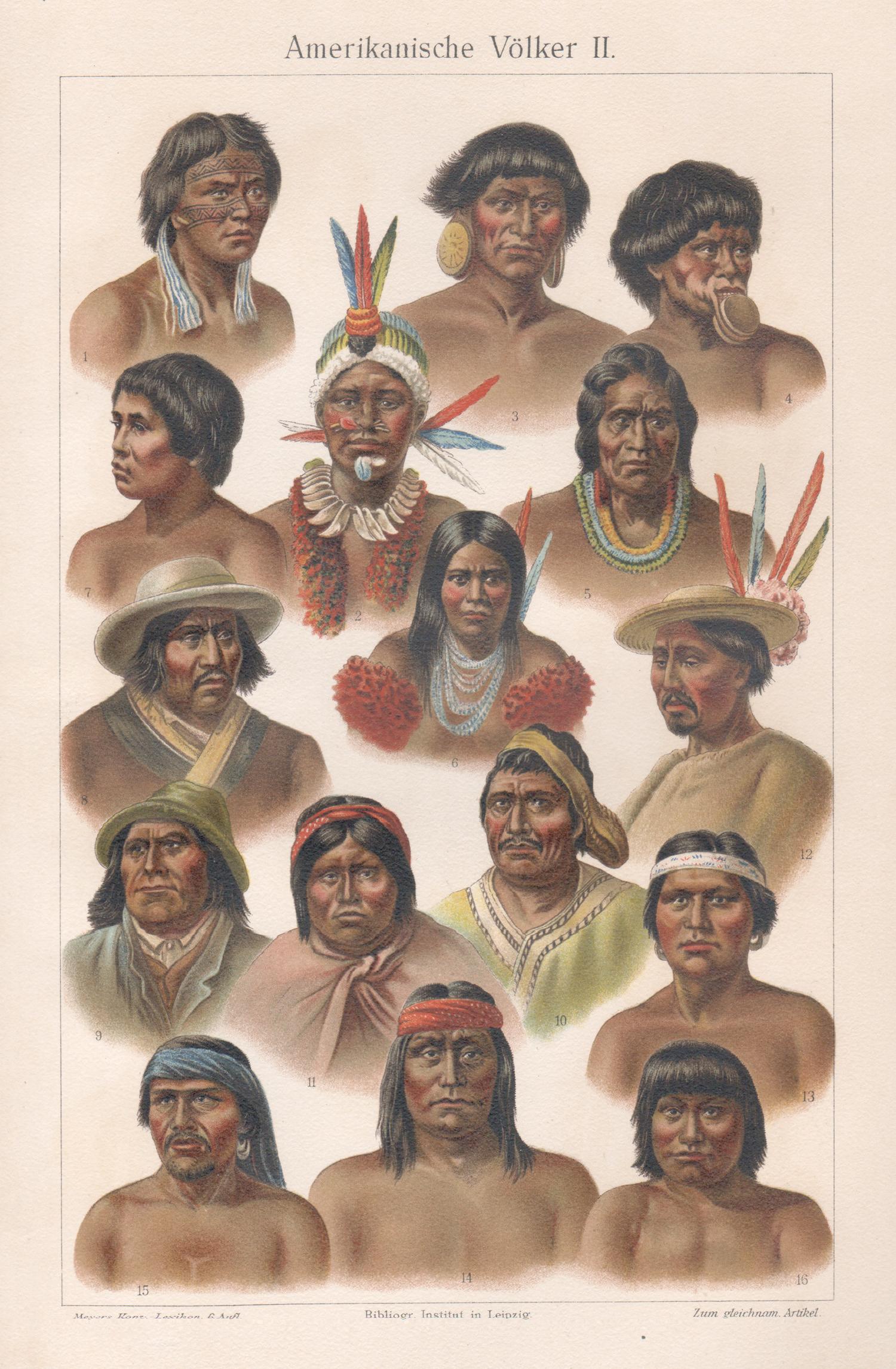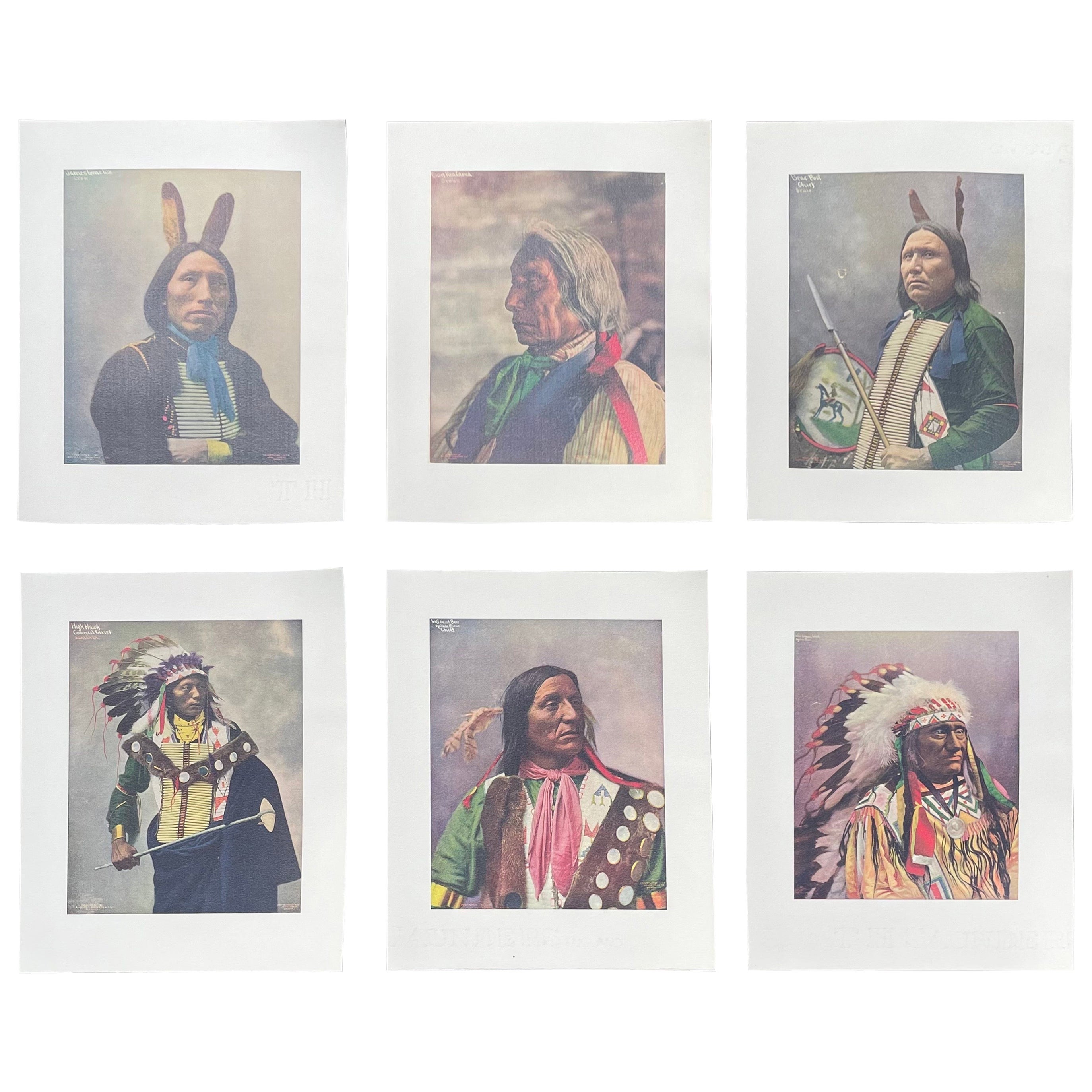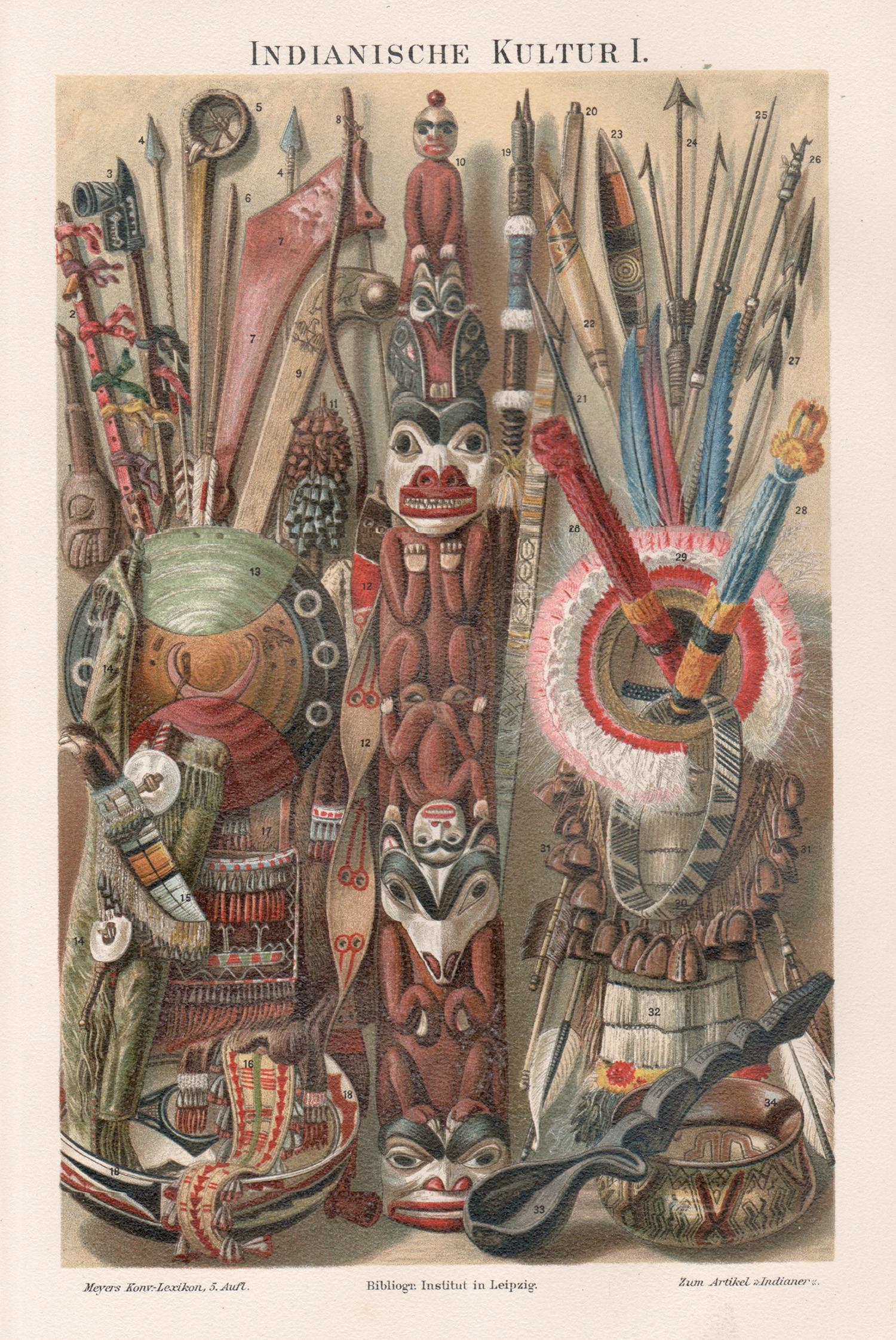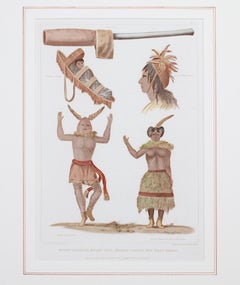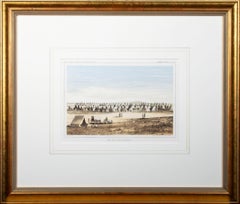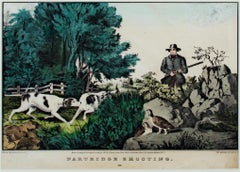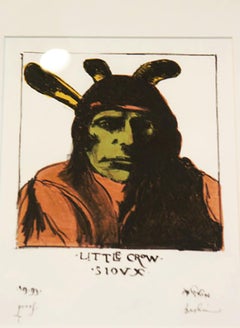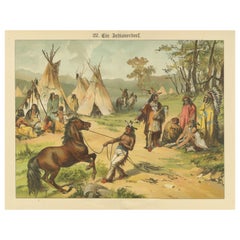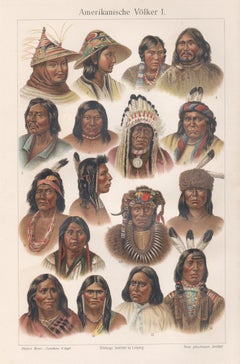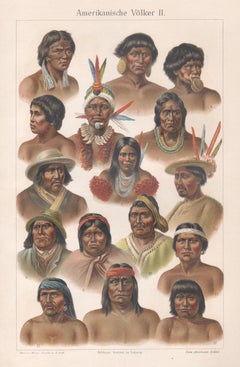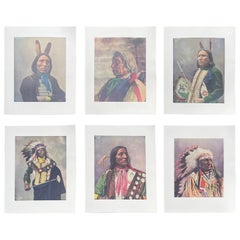Items Similar to 20th century color lithograph postcard indigenous figures landscape rock sky
Want more images or videos?
Request additional images or videos from the seller
1 of 8
Joseph Roy Willis20th century color lithograph postcard indigenous figures landscape rock sky1937
1937
$475
£370.12
€419.89
CA$682.68
A$751.70
CHF 389.79
MX$8,902.18
NOK 4,948.12
SEK 4,624.57
DKK 3,136.06
About the Item
"Navajo Indians At Home" is a color lithograph postcard by Joseph Roy Willis. A number of American Natives of varying ages and genders are depicted in the brightly colored clothing and brilliantly patterned hand-made blankets of the tribe. The reverse of the postcard, which is visible through the double-sided frame contains a brief printed description of the subject of the artwork, and the respective stamps given to mailed postage.
Addressed to Bobby Mullane of 2270 Madison Rd. Cincinnati Ohio, the sender, known only as L.C., writes "How do you like the looks of these Indians Bob? Love - L.C."
3 1/2" x 5 1/2" art
10 3/4" x 12 3/4" frame
J. R. Willis was born November 24th, 1876 in Goloid Community, Screven County, Georgia near Sylvania. His artistic career began as a political cartoonist during the Spanish American War. He also made fashion drawings for the Atlanta Constitution newspaper. Around 1908 he went to New York and studied painting with Robert Henri. Next, he went to Hollywood where he painted backdrops for Universal Studios. He also spent ten years in vaudeville as a "chalk talk" artist.
In 1917 Willis was headed for New York to look for syndication for his cartoons when he stopped in Arizona to sketch Hopis. He decided to stay in the Southwest and set up a photography studio in Gallup, New Mexico. As he toured many of the pueblos to take photos, he began doing paintings from his photos.
He frequently went to Miami, Florida in the winters to visit family. From there he made trips to Cuba, Haiti, and the Dominican Republic and painted many landscapes. He was well known for his photography. But he was best known by far for his portraits of the American Indians from New Mexico and Arizona. He was also referred to as the "Aspen King" for his lovely paintings of the aspens turning golden in the fall.
In 1931 he moved to Old Town in Albuquerque, New Mexico where he built a house and studio. Willis was quite a character, wearing a cape and smoking Pall Mall cigarettes in an ivory holder. He is remembered by the old-timers in Albuquerque for dressing with a flair for the dramatic and his love of discussing his paintings.
Willis continued to paint up until the time of his death. His paintings are in the Albuquerque Museum, a Japanese museum in Imabari, Shikoku, and a museum in Valledupar, Cesar, Colombia, South America.
- Creator:Joseph Roy Willis (1876 - 1960, American)
- Creation Year:1937
- Dimensions:Height: 10.75 in (27.31 cm)Width: 12.75 in (32.39 cm)
- Medium:
- Period:
- Framing:Frame IncludedFraming Options Available
- Condition:Phenomenal condition given its age and journey from Albuquerque NM to Cincinnati OH back in 1937.
- Gallery Location:Milwaukee, WI
- Reference Number:Seller: 5260d1stDibs: LU60532775211
About the Seller
4.9
Gold Seller
Premium sellers maintaining a 4.3+ rating and 24-hour response times
Established in 1966
1stDibs seller since 2017
452 sales on 1stDibs
Typical response time: 1 hour
- ShippingRetrieving quote...Shipping from: Milwaukee, WI
- Return Policy
More From This Seller
View All19th century color engraving indigenous figures feathers text full body face
By Seth Eastman
Located in Milwaukee, WI
"Moqui Dancers, Moqui Pipe, Navajo Cradle & Headdress" is a hand-colored engraving by Seth Eastman. It depicts encyclopedic depictions of Native American...
Category
1840s More Prints
Materials
Engraving
'Camp Red River Hunters' original lithograph by John Mix Stanley
By John Mix Stanley
Located in Milwaukee, WI
In the mid-nineteenth century, the United States government set out to survey and document its newly acquired lands and territories west of the Mississippi. The goals of these surveys were manifold: to produce topographical maps, to document flora and fauna, and to document natural resources to build the emerging US economy. These surveys, and the images from them, also functioned to build the new sense of American identity with the landscape, condensing vistas into the 'picturesque' tradition of European image making. Thus, the entire span of US territory could be seen as a single, cohesive whole.
This lithograph comes from one of six surveys commissioned by the Army's Topographic Bureau in 1853, which sought to find the best route to construct a transcontinental railroad. The result was a thirteen-volume report including maps, lithographs, and technical data entitled 'Explorations and Surveys to ascertain the most practicable and economical route for a Railroad from the Mississippi river to the Pacific Ocean.' In particular, the print comes from the northern survey, commanded by Isaac Stevens, which explored the regions between the 47th and 49th parallels.
In this image, Stanley shows an encampment of the people known as the Red River of the North hunters. They were generations of European and mixed-race trappers who lived on the frontier and had Indian wives and mixed-race children. They had come to the area for bison hunting, as the herds were still vast on the prairies. In the image, the figures and their encampment are dwarfed by the vast landscape around them, indicating the sublimity of these new American territories.
5.75 x 8.75 inches, image
6.5 x 9.25 inches, stone
17 x 20 inches, frame
Artist 'Stanley Del.' lower left
Entitled 'Camp Red River Hunters' lower center margin
Publisher 'Sarony, Major & Knapp. Lith.s 449 Broadway N.Y.' lower right
Inscribed 'U.S.P.R.R. EXP. & SURVEYS — 47th & 49th PARALLELS' upper left
Inscribed 'GENERAL REPORT — PLATE XII' upper right
Framed to conservation standards using 100 percent rag matting with French accents; glazed with UV5 Plexiglas to inhibit fading; housed in a gold reverse ogee moulding.
Print in overall good condition; some localized foxing and discoloration; minor surface abrasions to frame.
John Mix Stanley...
Category
1850s Romantic Landscape Prints
Materials
Lithograph
19th century color lithograph watercolor landscape figurative animal print
By Nathaniel Currier
Located in Milwaukee, WI
The present hand-colored lithograph presents the viewer with a hunting scene in a picturesque landscape. In the foreground, a man approaches two partridges as his two pointers prepare to flush them out. Beyond, a white fence draws our eyes to the homestead in the distance. Images like this one show how people in the United States were trying to identify themselves as a new nation in the North American landscape - as separate from their European counterparts but with similar similar and specific wildlife and magesties of nature. It also identifies hunting in this landscape as an American pastime.
9.25 x 12.5 inches, artwork
18.38 x 22 inches, frame
Entitled bottom center "Partridge Shooting...
Category
Mid-19th Century Romantic Figurative Prints
Materials
Watercolor, Lithograph
Original Lithograph Native American Figure Portrait Male Tribe Bold Stoic Signed
By Leonard Baskin
Located in Milwaukee, WI
"Little Crow-Sioux" is an original lithograph created by Leonard Baskin. This is a proof purchased directly from the artist. Baskin signed the work in the lower right margin and lab...
Category
1990s Post-Modern Figurative Prints
Materials
Lithograph, Ink
Early 20th century color lithograph poster mountain field houses trees sky text
By Paul Kelsch
Located in Milwaukee, WI
"Dauphine" is an offset lithograph of a pastoral landscape created by Paul Kelsch for the Societe Nationale des Chemis de fer Francais, the French National Railways.
24" x 39" paper
30 1/2" x 21 1/8" image
48" x 33" frame
Small hole in each corner, crease in paper and image upper left, small holes lower left.
The SNCF, the French National Rail system, commissioned multiple posters to advertise and celebrate the connected locations on their routes after the Second World War. "Dauphine", created by Paul Kelsch, showcases a small village at the foot of a mountain bathed in the light of a sunset. Kelsch's technique employed impasto brush strokes and bright colors to capture the beauty of the landscape. This scene is in stark contrast to the destruction that the war had wrought in this area during the 1944 invasion. Because of this, the set of posters...
Category
1940s Other Art Style Landscape Prints
Materials
Lithograph
Native American Nature Village Community Western 1970's Animals Seasons Signed
By Charles Damrow
Located in Milwaukee, WI
"Teepee/Indian Village" is an original oil painting on wood panel by Charles Damrow. The artist signed and dated the piece in the lower left. This paint...
Category
1970s American Impressionist Landscape Paintings
Materials
Oil, Wood Panel
You May Also Like
Antique Chromolithograph of a Native American Village Scene, circa 1890
Located in Langweer, NL
Antique Chromolithograph of a Native American Village Scene, circa 1890
This vivid chromolithograph, titled “Ein Indianerdorf” (A Native American Village), was published around 1890...
Category
Antique Late 19th Century German Prints
Materials
Paper
Native North Americans, German chromolithograph, circa 1895
Located in Melbourne, Victoria
German chromolithograph of native American tribes. Circa 1895.
Each portrait is numbered.
Category
Late 19th Century Naturalistic Portrait Prints
Materials
Lithograph
Native North and South Americans, German chromolithograph, circa 1895
Located in Melbourne, Victoria
German chromolithograph of native American tribes. Circa 1895.
Each portrait is numbered.
Category
Late 19th Century Naturalistic Portrait Prints
Materials
Lithograph
American Indian Portraits, High Quality Prints, Total of 6
Located in Bedford Hills, NY
Beautiful set of 6 photo prints of American Indians.
Category
Mid-20th Century American Native American Prints
Materials
Paper
Native North American Artefacts, German chromolithograph, circa 1895
Located in Melbourne, Victoria
German chromolithograph of native American artefacts. Circa 1895.
Category
Late 19th Century Naturalistic Portrait Prints
Materials
Lithograph
We Shall Not Talk of War, American Western Art Lithograph by Noel Daggett
By Noel Daggett
Located in Long Island City, NY
Noel Daggett, American (1925 - 2005) - We Shall Not Talk of War, Year: circa 1979, Medium: Lithograph, signed and numbered in pencil, Edition: 300, AP 40, Image Size: 19 x 25 inc...
Category
1970s American Realist Animal Prints
Materials
Lithograph
More Ways To Browse
Vintage Cigarette Holder
Pall Mall
Timer Vintage
Ivory Cigarette Holder
J R Willis
Salvador Dali Don Quixote Etching
Salvador Dali Exhibition Poster
Salvador Dali Icarus
Salvador Dali Judgement
Salvador Dali Libra
Salvador Dali Litho
Salvador Dali Lobster
Salvador Dali Mao
Salvador Dali Melting Clock
Salvador Dali Pig
Salvador Dali Shakespeare
Salvador Dali Woman With A Whip
Sascha Schneider
